The International Trombone Association has several awards it bestows each year. The individual awards are the ITA Award, presented every year to an individual who has greatly influenced the field of trombone, the Neill Humfeld Award, which recognizes outstanding trombone teaching in our profession while honoring the teaching excellence of the late Neill Humfeld, the Legacy Circle Award, for unparalleled accomplishments in the trombone community, the Lifetime Achievement Award, for contributions to the trombone profession over a long career.
The ITA has great pleasure in announcing winners for awards for 2019.
ITA Award: Michael Mulcahy
The ITA Award recognizes the highest level of creative and artistic output in areas such as performance, composition, arranging, teaching, conducting, research and/or service.
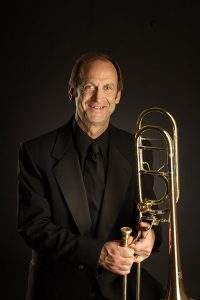 Michael Mulcahy is the internationally recognized Chicago Symphony trombonist. He has appeared as a soloist and teacher in the United States, Canada, United Kingdom, Ireland, Germany, Holland, Italy, Sweden, Denmark, Russia, Japan, China, Argentina, New Zealand, and Australia. He has appeared as a soloist with the Chicago Symphony Orchestra and Pierre Boulez in the music of Elliot Carter, and most recently with Daniel Barenboim in Leopold Mozart’s Concerto for Alto Trombonewhich was also broadcast widely on public television. Other solo appearances include the Bavarian Radio Symphony Orchestra, the Hilversum Radio Symphony Orchestra, and on tour with the Melbourne Symphony Orchestra. He appears regularly as soloist for Bach Week.
Michael Mulcahy is the internationally recognized Chicago Symphony trombonist. He has appeared as a soloist and teacher in the United States, Canada, United Kingdom, Ireland, Germany, Holland, Italy, Sweden, Denmark, Russia, Japan, China, Argentina, New Zealand, and Australia. He has appeared as a soloist with the Chicago Symphony Orchestra and Pierre Boulez in the music of Elliot Carter, and most recently with Daniel Barenboim in Leopold Mozart’s Concerto for Alto Trombonewhich was also broadcast widely on public television. Other solo appearances include the Bavarian Radio Symphony Orchestra, the Hilversum Radio Symphony Orchestra, and on tour with the Melbourne Symphony Orchestra. He appears regularly as soloist for Bach Week.
Michael is the winner of several international competitions, among them the Australian Broadcasting Corporation Instrumental Competition, the ARD International Music Competition in Munich, the Viotti International Competition in Italy, and the International Instrumental Competition in Markneukirchen, in the former East Germany.
The Neill Humfeld Award: Nathaniel Brickens
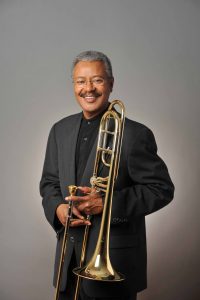 Professor of Music at The University of Texas at Austin, Nathaniel Brickens teaches trombone and serves as director of the internationally acclaimed UT Trombone Choir. He holds a DMA from the University of Texas at Austin, an MM from the University of Michigan, and a BM from Southern University. In recognition of his teaching, he has received several citations including being nominated for a 2013 UT Regents Outstanding Teacher Award, a 2012 Blunk Memorial Professorship, and the UT Senate of College Councils 2009 Professor of the Year Award. He was the recipient of a 2009 College of Fine Arts Distinguished Teacher Award, a 2006–07 Dad’s Association Centennial Teaching Fellowship, and a 2005 Texas Exes Excellence in Teaching Award. His students have won competitions sponsored by the International Trombone Association, the Eastern Trombone Workshop, the Zellmer Minnesota Orchestra Trombone Competition, Big XII Conference, MTNA, Fort Worth Trombone Summit, and others.
Professor of Music at The University of Texas at Austin, Nathaniel Brickens teaches trombone and serves as director of the internationally acclaimed UT Trombone Choir. He holds a DMA from the University of Texas at Austin, an MM from the University of Michigan, and a BM from Southern University. In recognition of his teaching, he has received several citations including being nominated for a 2013 UT Regents Outstanding Teacher Award, a 2012 Blunk Memorial Professorship, and the UT Senate of College Councils 2009 Professor of the Year Award. He was the recipient of a 2009 College of Fine Arts Distinguished Teacher Award, a 2006–07 Dad’s Association Centennial Teaching Fellowship, and a 2005 Texas Exes Excellence in Teaching Award. His students have won competitions sponsored by the International Trombone Association, the Eastern Trombone Workshop, the Zellmer Minnesota Orchestra Trombone Competition, Big XII Conference, MTNA, Fort Worth Trombone Summit, and others.
As a free-lance trombonist, Brickens has performed with the St. Louis Symphony, the Kansas City Symphony, the Houston Symphony, Opera St. Louis, the Austin Symphony, the San Antonio Symphony, the Victoria Bach Festival Orchestra, Ray Charles, Lena Horne, the Temptations, Andrea Bocelli, and with a wide variety of other popular artists.
The Lifetime Achievement Award: Irvin L Wagner
The Lifetime Achievement Award recognizes people who have distinguished themselves by their contributions to the trombone profession over a long career.
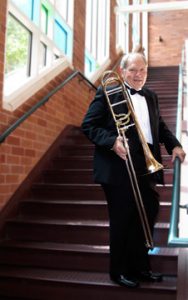 Dr. Irvin L. Wagner is a faculty member at the University of Oklahoma where he is holds the distinguished titles of David Ross Boyd and Regents Professor of Music. At the University he teaches trombone as well as serves as Coordinator of Graduate Music Studies. Complimentary to his regular duties at the University he is a trombonist in the Oklahoma City Philharmonic Orchestra as well as an occasional Conductor for Pops Concerts of the Orchestra. He also serves as Guest Conductor of the Austin (Texas) Symphony Orchestra conducting ballet performances and children’s concerts as well as Guest Conductor of the Kansas City Symphony Orchestra. Other orchestras around the world that he has conducted include the Russian Imperial Orchestra in St. Petersburg, Russia, and the Cannes Symphony Orchestra in France.
Dr. Irvin L. Wagner is a faculty member at the University of Oklahoma where he is holds the distinguished titles of David Ross Boyd and Regents Professor of Music. At the University he teaches trombone as well as serves as Coordinator of Graduate Music Studies. Complimentary to his regular duties at the University he is a trombonist in the Oklahoma City Philharmonic Orchestra as well as an occasional Conductor for Pops Concerts of the Orchestra. He also serves as Guest Conductor of the Austin (Texas) Symphony Orchestra conducting ballet performances and children’s concerts as well as Guest Conductor of the Kansas City Symphony Orchestra. Other orchestras around the world that he has conducted include the Russian Imperial Orchestra in St. Petersburg, Russia, and the Cannes Symphony Orchestra in France.
Irvin served as President of the International Trombone Association from 1982–1984, and during his tenure traveled completely around the world performing, teaching, and organizing national trombone chapters in such countries as Japan, New Zealand, South Africa, Israel, Greece, and Great Britain. This activity around the world resulted in him being “the Most Listened to Trombonist in the World in the 80s” as he was heard by more than a quarter of the population of the earth. This came about through his public performances in over 30 countries and especially through a Television Special in China viewed by over 600 million people and a radio recital in India listened to by 500 million people. Most recent global musical activities have included performances both as trombonist and conductor in China, Brazil, and Russia.
Before coming to Oklahoma, Irv taught at Louisiana State University and performed in the Baton Rouge Symphony, and prior to that he was Director of Bands at McPherson College in Kansas and a member of the Wichita Symphony Orchestra.
Dr. Wagner holds a Bachelor’s Degree from McPherson College, as well as Master’s and Doctor’s Degrees from the Eastman School of Music. At Eastman he was a student of the late master teacher of the trombone, Emory Remington.
The Legacy Circle Award: Melba Liston, Urbie Green & Bill Watrous
The Legacy Circle recognizes individuals who have made a profound and lasting impact on the evolution of trombone playing.
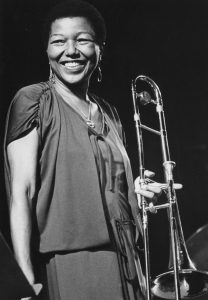 Melba Doretta Liston (January 13, 1926–April 23, 1999) was an American jazz trombonist, arranger, and composer. She was the first woman trombonist to play in big bands during the 1940s and 1960s, but as her career progressed she became better known as an arranger particularly in partnership with pianist Randy Weston. Liston was born in Kansas City, Missouri. At the age of seven, Melba’s mother purchased her a trombone. Her family was very encouraging of her musical pursuits, as they were all music lovers. Melba was primarily self-taught, but “encouraged by her guitar-playing grandfather,” who she spent significant time with learning to play spirituals and folk songs. At the age of eight, she was already good enough to be soloing on the local radio station. At the age of ten, she moved to Los Angeles, California. She was classmates with Dexter Gordon, and friends with Eric Dolphy. After playing in youth bands and studying with Alma Hightower and others, she joined the big band led by Gerald Wilson in 1944. She began to work with the emerging major names of the bebop scene in the mid-1940s. She recorded with saxophonist Dexter Gordon in 1947, and joined Dizzy Gillespie’s big band (which included saxophonists John Coltrane, Paul Gonsalves, and pianist John Lewis) in New York for a time, when Wilson disbanded his orchestra in 1948. Liston initially performed in a supporting role and was nervous when asked to take solos, but with encouragement she became more comfortable as a featured voice in the bands. She toured with Count Basie for a time, and then with Billie Holiday (1949) but was so profoundly affected by the indifference of the audiences and the rigors of the road that she gave up playing and turned to education instead. Liston taught for about three years.
Melba Doretta Liston (January 13, 1926–April 23, 1999) was an American jazz trombonist, arranger, and composer. She was the first woman trombonist to play in big bands during the 1940s and 1960s, but as her career progressed she became better known as an arranger particularly in partnership with pianist Randy Weston. Liston was born in Kansas City, Missouri. At the age of seven, Melba’s mother purchased her a trombone. Her family was very encouraging of her musical pursuits, as they were all music lovers. Melba was primarily self-taught, but “encouraged by her guitar-playing grandfather,” who she spent significant time with learning to play spirituals and folk songs. At the age of eight, she was already good enough to be soloing on the local radio station. At the age of ten, she moved to Los Angeles, California. She was classmates with Dexter Gordon, and friends with Eric Dolphy. After playing in youth bands and studying with Alma Hightower and others, she joined the big band led by Gerald Wilson in 1944. She began to work with the emerging major names of the bebop scene in the mid-1940s. She recorded with saxophonist Dexter Gordon in 1947, and joined Dizzy Gillespie’s big band (which included saxophonists John Coltrane, Paul Gonsalves, and pianist John Lewis) in New York for a time, when Wilson disbanded his orchestra in 1948. Liston initially performed in a supporting role and was nervous when asked to take solos, but with encouragement she became more comfortable as a featured voice in the bands. She toured with Count Basie for a time, and then with Billie Holiday (1949) but was so profoundly affected by the indifference of the audiences and the rigors of the road that she gave up playing and turned to education instead. Liston taught for about three years.
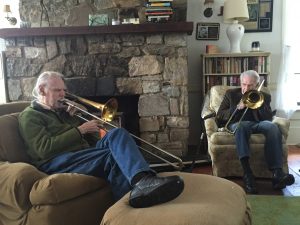 Urbie Green was born Urban Clifford Green. It is with sadness that I add Urbie’s name to the list of legacy circle greats. He was for many trombone players, including myself, a hero and inspiration. Urbie passed away on Monday, December 31, 2018, at Saucon Valley Manor, Hellertown, Pennsylvania. He was the loving husband of actress and singer Catherine “Kathy” (Prestigiacomo) Green. Urbie was born August 8, 1926, in Mobile, Alabama, and the son of the late Robert Eugene and Aurora (Blanche) Green.
Urbie Green was born Urban Clifford Green. It is with sadness that I add Urbie’s name to the list of legacy circle greats. He was for many trombone players, including myself, a hero and inspiration. Urbie passed away on Monday, December 31, 2018, at Saucon Valley Manor, Hellertown, Pennsylvania. He was the loving husband of actress and singer Catherine “Kathy” (Prestigiacomo) Green. Urbie was born August 8, 1926, in Mobile, Alabama, and the son of the late Robert Eugene and Aurora (Blanche) Green.
Urbie was known as the “trombonist’s trombonist” and is very much considered to be among the elite of the world’s trombone players, due to not only his mastery of the instrument, including his smooth, warm, mellow tone, but also his lyrical phrasing and beautiful solos. Urbie was able to play in any style.
By the time he was 16, he was working professionally with Tommy Reynolds’s band. Then followed years touring with big bands led by Jan Savitt, Frankie Carle, Gene Krupa, and Woody Herman. In October 1950, Urbie became part of Herman’s Thundering Herd, and in 1954, won the Down Beat International Critics Award for “New Star.”
Urbie became one of the most sought-after trombonists for recording and club work in New York City. He has recorded with Gene Krupa, Woody Herman, Benny Goodman, Louis Armstrong, Count Basie, Leonard Bernstein, Frank Sinatra, Billie Holiday, Tony Bennett, Peggy Lee, Pearl Bailey, Ella Fitzgerald, Miles Davis, Charlie Parker, Coleman Hawkins, Dizzy Gillespie, Barbra Streisand, Perry Como, Aretha Franklin, Quincy Jones, J.J. Johnson, Antonio Carlos Jobim, Burt Bacharach, Buck Clayton, and Herbie Mann.
He is a multiple winner of the Most Valuable Player Award from the National Academy of Recording Arts and Sciences. In addition, he performed at major jazz festivals—including the annual Celebration of the Arts (COTA) in Delaware Water Gap—as well as concert halls and the White House. In a performance at Lincoln Center with an all-star band led by Benny Carter, he was invited to perform in a special tribute to Ella Fitzgerald, and later in Thailand, with the Benny Carter all-stars, in a private performance for the King of Thailand. He also placed high importance on enriching the music community through countless clinics for students at high schools and colleges throughout the world.
As part of his solo career, Urbie recorded more than 25 original albums from the early 1950s to the late 1990s, including classics such as “Blues and Other Shades of Green” (1955, Paramount), “Let’s Face the Music and Dance” (1957, RCA), “The Persuasive Trombone of Urbie Green” (1960 ,Command), “21 Trombones” (1967, Project 3), “Urbie Green’s Big Beautiful Band” (1974, Project 3), and “The Fox” (1976, CTI).
Some of his popular recordings include “Here’s That Rainy Day,” “Stars Fell on Alabama,” “Let’s Face the Music and Dance,” “The Flight of the Bumble Bee,” “Bein’ Green,” “Blue Flame,” “You Are So Beautiful,” “Quadrabones,” “Another Star,” “Sing,” “Perdido,” “St. Louis Blues,” “Stardust,” “Ave Maria,” and “Ana Luiza.”
Urbie can be seen and heard in the movie “The Benny Goodman Story” (1956, Universal), starring Steve Allen and Donna Reed. Shortly afterwards, he fronted the Benny Goodman Orchestra for a three-month tour. In 1995, he was elected into the Alabama Jazz Hall of Fame.
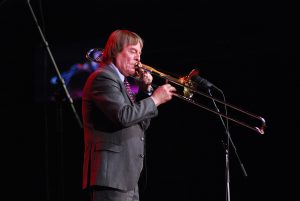 Bill Watrous, one of the world’s most respected trombonists, died on July 2, 2018, at a hospital in Los Angeles. He was 79. Mr. Watrous was heard often on studio recordings by artists like Quincy Jones, Prince, and Frank Sinatra. But over a nearly 50-year career as a bandleader, he also released more than a dozen albums under his own name, spotlighting his eloquent playing in a range of contexts.
Bill Watrous, one of the world’s most respected trombonists, died on July 2, 2018, at a hospital in Los Angeles. He was 79. Mr. Watrous was heard often on studio recordings by artists like Quincy Jones, Prince, and Frank Sinatra. But over a nearly 50-year career as a bandleader, he also released more than a dozen albums under his own name, spotlighting his eloquent playing in a range of contexts.
William Russell Watrous was born on June 8, 1939, in Middletown, Connecticut, and raised in Niantic, Connecticut. His father, Ralph, a trombonist who had played in vaudeville and regional bands, became his first role model. His mother, Edna (Little) Watrous, was a nurse and the head of the local nursing association.
Bill played with traditional jazz groups around Connecticut before joining the Navy at 18. He was assigned to a Navy Band unit in San Diego, then eventually reassigned to Brooklyn. While there, he apprenticed himself to Herbie Nichols, the iconoclastic bebop pianist and composer.
He stayed in New York after being discharged, and in 1965 he joined the “Merv Griffin Show” band. A few years later he became a member of the “Dick Cavett Show” ensemble. His professional career in the 1960s, included playing in ensembles led by the trumpeter Billy Butterfield and the trombonist Kai Winding and contributed to albums by the likes of Woody Herman, Wes Montgomery, Milton Nascimento, and Chick Corea.
He did a short stint with the rock group Ten Wheel Drive before the influential producer John Hammond signed Manhattan Wildlife Refuge to Columbia. That band released two albums of swirling, up-tempo fusion—a rough hybrid of early Return to Forever, Herbie Hancock’s Mwandishi, and Chicago. It was not a major commercial success, but it cemented Mr. Watrous’s reputation as a composer and bandleader as well as a virtuoso instrumentalist.
After relocating to Los Angeles in 1977, Mr. Watrous became an in-demand session player, heard on dozens of albums and television scores, including Mr. Jones’s acclaimed soundtrack to the popular mini-series “Roots.”
He later taught at the University of Southern California for two decades, retiring in 2015. For most of his career, Mr. Watrous gave frequent master classes across the country. He also wrote an instruction book, “Trombonisms,” with Alan Raph. A jazz festival at Sam Houston State University in Huntsville, Tex., where he frequently performed and taught, was named after him.
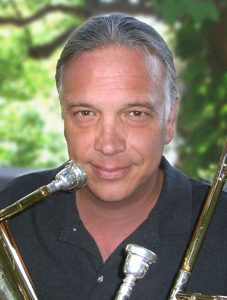 The Presidents’ Award 2019: Bill Reichenbach
The Presidents’ Award 2019: Bill Reichenbach
Each year the ITA President currently Ben van Dijk is able to give an award to a deserving individual or organisation. This year ben chose Bill Reichenbach for this honor.
A native of Takoma Park, Maryland, Bill was educated at the Eastman School of Music where he studied with Emory Remington. Relocating to Los Angeles in 1975, Bill has played on at least 1000 records, 600 movies plus countless jingles and television shows. Primarily a bass trombone player, Bill also plays tenor trombone, contra bass trombone, euphonium and tuba. The Bill Reichenbach Quartet CD continues to be heard on jazz radio stations throughout the country.
Bill is a member and on the board of directors of The American Federation of Musicians–Union Local 47, as well as a member of the board of the Recording Musicians Associations of Los Angeles (RMALA).
New for 2019: The Kenneth Hanlon Award
Professor of music theory and director of the Arnold Shaw Popular Music Research Center, Ken Hanlon attended Peabody Conservatory, where he studied with Armand Sarro. Hanlon performed with the Baltimore Symphony Orchestra, played for traveling Broadway shows, and backed up such acts as Mel Torme, Gladys Knight and the Pips, Lana Cantrell, and the Temptations, among others. Hanlon joined the music faculty at UNLV in 1970 and served as chair of the music department and was a member of the Las Vegas Symphony Orchestra. He helped found the Nevada Dance Theater (now Nevada Ballet Theatre) in 1972 and was instrumental in the establishment of the Nevada School for the Arts, New World Brass Quintet, Sierra Winds, Las Vegas Opera Association, Las Vegas Chamber Players, Las Vegas Jazz Society, and other arts organizations. In 1984, Hanlon was chosen to receive the Nevada Governor’s Arts Award as an arts educator. Hanlon was a past president of the International Trombone Association (ITA). Ken Hanlon, age 77, passed away peacefully with his family at his side on November 27, 2018, at St. Rose Siena Hospital. Ken was undoubtedly a modest man and one of the most humble and generous individuals one would ever want to meet. The Awards Committee are therefore delighted to be able to offer for the first time this award to Steve Wolfinbarger.
The 2019 Ken Hanlon Award winner—Steve Wolfinbarger
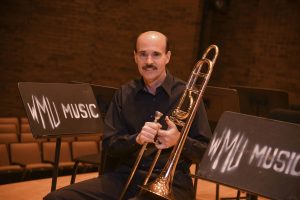 Steve Wolfinbarger is professor of music at Western Michigan University. He earned his Bachelor of Music Education degree from Evangel University in Springfield, Missouri, and his Master of Music and Doctor of Musical Arts degrees in trombone performance from the University of North Texas.
Steve Wolfinbarger is professor of music at Western Michigan University. He earned his Bachelor of Music Education degree from Evangel University in Springfield, Missouri, and his Master of Music and Doctor of Musical Arts degrees in trombone performance from the University of North Texas.
Over the past few years Professor Wolfinbarger has won several major teaching awards, honors, and recognitions. He was selected as the Michigan Professor of the Year for 2013 by the Carnegie Foundation for the Advancement of Teaching and the Council for Advancement and Support of Education (CASE) in Washington, DC. He was also one of fifteen nominees statewide for the 2013 Michigan Distinguished Professor of the Year Award. Wolfinbarger was the recipient of the 2010 Western Michigan University Distinguished Teaching Award, the highest award given to any professor at WMU. He was recently selected as the WMU College of Fine Arts Greg Roehrick Distinguished Professor for 2014, and he was also presented with the College of Fine Arts Dean’s Teaching Award in 2009. He was the sole recipient of the 2009 International Trombone Association’s prestigious ITA Award “in recognition of his distinguished career and in acknowledgement of his impact on the world of trombone performance,” the highest prize awarded by the International Trombone Association.
Wolfinbarger was President of the International Trombone Association from 1994–1996, and he was the director of the International Trombone Festival and chair of the International Trombone Festival Site Selection Committee from 1992–2001. He also hosted and organized the 1990 International Trombone Workshop which was held at WMU. He is currently the chair of the ITA Governance Committee, and he has published articles in the International Trombone Association Journal. He served on a steering committee with six other leading trombone teachers to develop a national trombone pedagogy manual for public school music teachers in an effort to increase the quality and quantity of trombone students in the United States. He was also the subject of a feature article in Director Magazine.
Wolfinbarger has appeared as a guest soloist or clinician at numerous regional, national and international conferences, including the Midwest Trombone Workshop, National Fine Arts Festival, Midwestern Music Conference, the Arizona Low Brass Symposium, several Brazilian National Trombone Symposiums, and the Latin America Trombone Symposium. He has been featured as a guest performer or clinician at major music conservatories in The Netherlands, Finland, and Mexico, and in the United States at the Chautauqua Institute, The Eastman School of Music and more than 25 colleges and universities. As a member of the Western Brass Quintet, he has performed in Canada, Germany, Russia, and The People’s Republic of China. He has also performed as an extra with the Dallas Symphony Orchestra, and with the Springfield (Missouri) and Kalamazoo Symphony Orchestras.
Students in his studio have competed successfully and have won a number of important competitions. Since 2001 students have been selected as finalists in the various International Trombone Association competitions on 19 occasions (including 18 times in the last 11 years), and they have been selected as winners in their respective competitions six of the past eight years. In addition, they have been invited to compete as semi-finalists or finalists at the American Trombone Workshop’s National Solo Competition nine times since 2005. Two separate students have recently been chosen as winner and honorable mention in the Yamaha Young Performing Artists Competition. His students have been selected as finalists in both the Minnesota Orchestra’s Steve Zellmer Orchestral Excerpt Competition and the Music Club of Detroit solo competition. Since 2000, graduates of his studio have been admitted to some of the most competitive music programs in the United States, including The Juilliard School, Yale University, The Eastman School of Music, Cleveland Institute of Music, New England Conservatory, Cincinnati Conservatory, Oberlin Conservatory, Northwestern University, University of North Texas, Florida State University and Indiana University, to name a few.